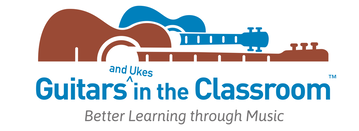WHY MUSIC IN EARLY CHILDHOOD MATTERS
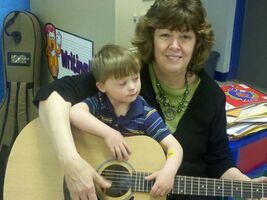
Young children acquire language and musicality at the same time if given the opportunity because these skills occur in the same parts of our brains. Between birth and six, we humans experience rapid brain development. Children who learn to make music during infancy through the elementary years. Neuroscientists working on a recent scientific study at USC, "... found the auditory systems of children in the music program were maturing faster in them than in the other children. The fine-tuning of their auditory pathway could accelerate their development of language and reading, as well as other abilities – a potential effect which the scientists are continuing to study. Please enjoy this article from USC on these findings HERE.
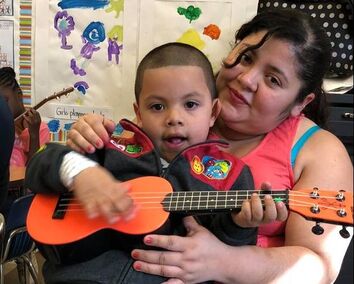
A large and growing body of evidence exists at this time that points to many benefits of bringing music making into children lives before age five. We are training early childhood educators to make music everyday while children are acquiring simple and complex sounds, building effective vocabulary, and developing language fluency words as the first phase of learning to read. This stage is called "phonological awareness."
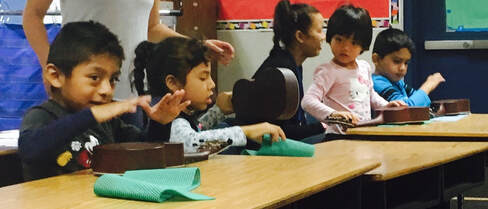
Pairing this timely language learning with singing and memorizing musical patterns - beats, rhythms and melodies - focuses these students and provides fun oral and auditory practice. It sets them up for success as young readers! This practice of "Teaching through the Power of Song" helps students with developmental and learning disabilities, too, as well as giving an extra boost to "English Learners" who are acquiring English as a new language.
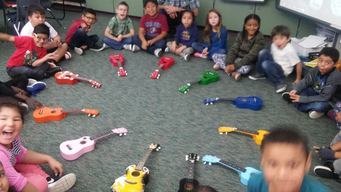
Few early childhood educators have musical training or experience these days. Many grew up without music education in their schools. The majority who incorporate songs are reliant on singing along with recordings or videos. But these are both unresponsive tools. The little singers have to "keep up." But playing an acoustic instrument is much better. Accompanying songs at the children's pace gives teachers a way to impart listening and speaking skills through songs. Strumming gives the teacher power to teach students to clap, pat and dance to a steady beat - and play the ukulele! Being able to strum and sing means we can vary both the volume of a song and its tempo! With an instrument, we can turn songs into musical games and these make and keep learning FUN!
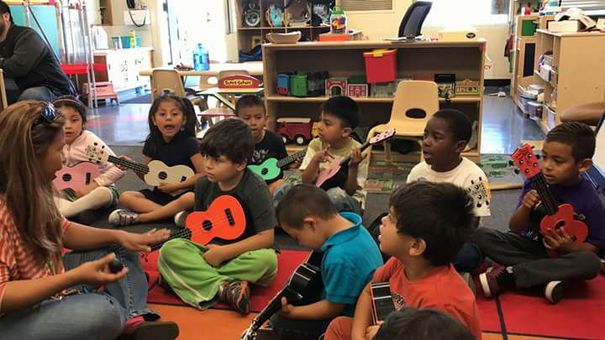
The steady beat is at the heart of language learning. That tick-tock rhythm creates an auditory scaffold for learning to speak words, utter phrases and read sentences. As with the rhythm of walking with even steps, we can recite spoken language over that beat and hear just where the syllables and pauses go! When children can hear that beat, match it, and learn to play it, their speaking and reading skills increase! Please help yourself to the fascinating studies that have been conducted at Northwestern University in the Auditory Neuroscience Lab run by Dr. Nina Kraus. Please click HERE for the presentation of one of these studies.

GITC's Early Childhood Education (ECE) programs train teachers working with students from ages three and up to instill basic musicality through the daily integration of songs, games, activities, movement, and fingerplay. The little ones learn to strum ukuleles made from high grade, disinfectable plastic. These "Makala Waterman"ukes are indestructible, colorful, and they sound wonderful! We recommend them highly to anyone working in ECE classrooms as well as in special education because they will last and are so safe. (Big kids love them too- they are great on class field trips to nature!) From our Head Start teacher training programs in Mississippi to the transitional kindergarten "Phonological Awareness through Music" workshops throughout the Los Angeles Unified School District, and our UTK residencies in San Diego and Los Angeles, thousands of little ones are developing music and language skills and self confidence at school everyday with GITC.

We are very grateful to Kala Brand Music and Saga Musical Instruments for helping GITC classrooms get these small and sturdy instruments into young hands!
